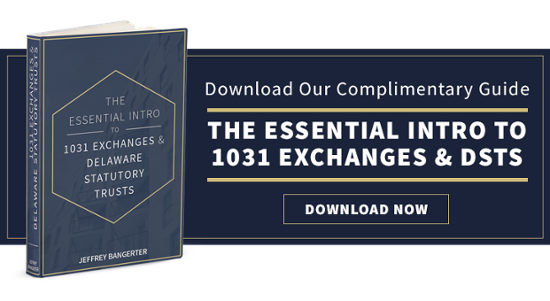Accredited investors who own a Delaware Statutory Trust (DST) are generally familiar with the rules governing a DST investment. But one area of confusion we often hear about relates to the ability for an investor to sell their fractional interest, and what that process entails.
DSTs typically have a required holding period of five to ten years This allows the underlying property or properties enough time to appreciate in value. It’s generally recommended that investors do not add a DST to your portfolio unless they have an investment time horizon that aligns with the intended holding period.
While DSTs are considered illiquid investments, if an investor has an emergency and need to access cash, they might be able to sell their fractional interest in a DST. However, it’s not likely to be a quick or easy process. For this reason, DST investors typically wait until their holding has gone “full cycle” to make their exit. In this post, we’ll explain the details of each of these scenarios and the steps required to exit a DST investment.
DST “Full Cycle” Liquidation
When the DST sponsor determines that the underlying property values are at a point where they will provide optimal gains for investors, the DST is said to have gone “full cycle” and it begins its liquidation. This typically occurs seven to 10 years after the initial creation of the trust.
When a DST liquidation is completed, investors need to evaluate their options:
- Engage in a 1031 exchange by reinvesting proceeds into a new suitable like-kind property
- Forego a 1031 exchange and take direct possession of the proceeds
If an investor chooses the second option, they will lose the ability to defer capital gains taxes and will need to pay all applicable taxes associated with the income gained from the sale of the DST.
Early Exit from a DST
Exiting a DST before it has gone full cycle can be a complex process and it is not guaranteed the ability to liquidate fractional shares. To initiate the sale, investors should contact the advisor who assisted them with purchasing the DST. The advisor will reach out to the DST sponsor to let them know the investors is looking to sell their fractional interest.
Some DSTs grant current shareholders the right of first refusal to purchase interests from any other shareholders who want to exit early. If there is an interested buyer, the sponsor will provide the necessary paperwork and help facilitate the transaction.
If there are no buyers from within the DST portfolio, the sponsor will typically reach out to investors in their other DST portfolios to offer them the investor’s fractional interest. If there is still no buyer, one will have to search for one on the secondary market. This can be done by working with a professional finder service, which typically also charges fees and commissions.
Exchange investors can also try to sell their fractional interest themselves. However, the process should only be done with the help of qualified financial, tax, and legal professionals.

Important Things to Consider
If an investor ends up having to sell their DST shares on their own, they should keep in mind that the buyer of the shares must also be an accredited investor. In some cases, it may be required to get approval from the DST sponsor before completing a share resale.
It’s also important to note the sale price of your DST shares is not guaranteed so the selling investor may not receive what was originally invested. The price received depends on multiple factors, including, but not limited to, current market conditions and demand for the shares in the specific DST, for example.
If a DST is purchased as a replacement property for a 1031 exchange, the IRS may want proof that the investor intends to hold the investment for the long term. While the IRS does not provide a specific minimum hold time, it is often recommend holding a replacement property for at least two years. This is typically considered a safe harbor period. After two years have passed, the IRS is unlikely to question the validity of the exchange based on the amount of time the replacement property is held.
Finally, if an exchange investor plans to reinvest the funds from a liquidated DST using a 1031 exchange, they must work with a qualified intermediary to help complete the liquidation so the investor does not take possession of the sales proceeds. Otherwise, the 1031 exchange will be disqualified and lose all tax benefits.
Despite the potential liquidity challenges, a DST can offer potential advantages, particularly for investors considering a 1031 exchange. Our complimentary e-book is a helpful resource to learn more about DSTs.
Because investor situations and objectives vary this information is not intended to indicate suitability or a recommendation for any individual investors.
This is for informational purposes only, does not constitute individual investment advice, and should not be relied upon as tax or legal advice. Please consult the appropriate professional regarding your individual circumstance.
There are material risks associated with investing in private placements, Delaware Statutory Trusts ("DSTs") and real estate securities including the potential loss of the entire investment principal, illiquidity, tenant vacancies impacting income and revenue, general and real estate market conditions, lack of operating history, interest rate risks, competition, including the risk of new supply coming to market and softening rental rates, general risks of owning/operating commercial and multifamily properties, short term leases associated with multi-family properties, financing risks, potential adverse tax consequences, general economic risks, development risks, long hold periods, and investors should read the PPM carefully before investing paying special attention to the risk section.
Investment advisory services offered through Bangerter Financial Services, Inc. A state Registered Investment Advisor. Registered Representative and securities offered through Concorde Investment Services, Inc. (CIS), member FINRA/SIPC. Bangerter Financial Services, Inc. is independent of CIS.





.png?width=273&height=103&name=Brokercheck%20(1).png)

Comments